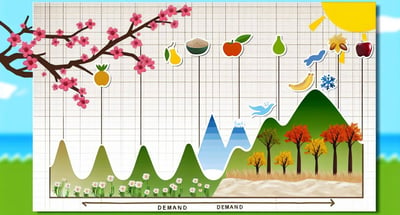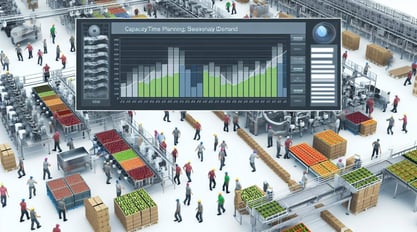Capacity Planning for Seasonal Demand Variations
Capacity planning stands as a crucial pillar for sustainable growth and profitability in the food and beverage manufacturing industry. With seasonal demand variations posing both challenges and opportunities, supply chain managers must employ strategic approaches to optimize production capabilities.
This blog looks into the nuances of capacity planning, particularly focusing on addressing seasonal demand fluctuations. Furthermore, we'll explore the integration between PlanetTogether, a leading capacity planning software, and prominent ERP, SCM, and MES systems like SAP, Oracle, Microsoft, Kinaxis, Aveva, and others, to streamline operations and enhance efficiency.

Seasonal Demand Variations
Seasonal demand variations are inherent in the food and beverage industry, driven by factors such as holidays, weather patterns, cultural events, and consumer preferences. From summertime beverage spikes to holiday feasting, these fluctuations can significantly impact production schedules, inventory levels, and overall operational efficiency. Supply chain managers must anticipate and adapt to these changes effectively to meet customer demands while minimizing costs and maximizing profitability.

The Role of Capacity Planning
At the heart of addressing seasonal demand variations lies effective capacity planning. This process involves forecasting demand, analyzing production capabilities, and aligning resources to meet fluctuating requirements. By accurately assessing capacity needs and optimizing resource utilization, food and beverage manufacturers can mitigate the risks associated with under or overproduction, ensuring timely delivery and customer satisfaction.

Challenges in Capacity Planning for Seasonal Demand Variations
Demand Forecasting Accuracy: Seasonal demand forecasting presents unique challenges due to fluctuating consumer preferences and external factors. Inaccurate forecasts can lead to underutilized capacity or stockouts, impacting revenue and customer loyalty.
Resource Allocation: Balancing resources during peak seasons requires careful consideration of labor, equipment, and raw materials. Poor resource allocation can result in bottlenecks, delays, and increased costs.
Production Scheduling Complexity: Managing diverse product lines and fluctuating demand adds complexity to production scheduling. Efficient scheduling is essential to optimize throughput and minimize idle time.
Inventory Management: Seasonal demand variations can strain inventory levels, leading to excess stock or shortages. Effective inventory management strategies are vital to maintain adequate stock levels while minimizing carrying costs.

Integration of PlanetTogether with ERP, SCM, and MES Systems
To address these challenges effectively, seamless integration between capacity planning software like PlanetTogether and ERP, SCM, and MES systems is paramount. Integration enables real-time data exchange, synchronization of processes, and holistic visibility across the supply chain, empowering supply chain managers with actionable insights and decision-making capabilities.
Benefits of Integration:
Enhanced Visibility: Integration provides real-time visibility into demand forecasts, inventory levels, production schedules, and resource availability, enabling proactive decision-making and risk mitigation.
Improved Efficiency: Streamlined processes and automated workflows optimize resource allocation, reduce lead times, and enhance overall operational efficiency.
Accurate Demand Forecasting: Integration facilitates data-driven demand forecasting by leveraging historical data, market trends, and external factors, leading to more accurate predictions and inventory management.
Seamless Communication: Integrated systems facilitate seamless communication and collaboration between departments, suppliers, and stakeholders, fostering transparency and agility in decision-making.
Scalability and Flexibility: Scalable solutions accommodate evolving business needs and seasonal demand fluctuations, ensuring adaptability and resilience in dynamic market environments.
Best Practices for Capacity Planning
Data-driven Decision Making: Leverage historical data, market trends, and predictive analytics to inform capacity planning decisions and optimize resource allocation.
Collaborative Planning: Foster collaboration between cross-functional teams, suppliers, and partners to align production schedules, mitigate risks, and capitalize on opportunities.
Scenario Planning: Conduct scenario analysis to evaluate the impact of different demand scenarios on capacity requirements, enabling proactive planning and risk management.
Continuous Improvement: Implement a culture of continuous improvement to refine processes, optimize workflows, and enhance efficiency over time.
Capacity planning for seasonal demand variations is a critical aspect of success in the food and beverage manufacturing industry. By embracing advanced technologies and integrating capacity planning software like PlanetTogether with ERP, SCM, and MES systems, supply chain managers can navigate challenges effectively and capitalize on opportunities for growth and profitability.
With a strategic approach, collaborative mindset, and commitment to excellence, food and beverage manufacturers can optimize production capabilities, meet customer demands, and thrive in dynamic market environments.
Are you ready to take your manufacturing operations to the next level? Contact us today to learn more about how PlanetTogether can help you achieve your goals and drive success in your industry.



